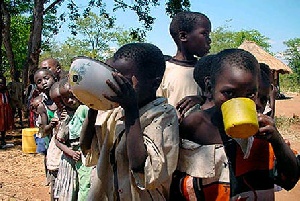Transitioning to middle-income status does not signal the end of poverty as the majority of the world’s poor still live in middle-income countries, the World Bank and the IMF have said at their latest Development Committee meeting, a forum that advises the two institutions.
“In many developing countries, growth has been accompanied by rising inequality,” a communiqué from the meeting said, warning that if countries do not sustain the building of “shared prosperity”, growth will eventually be obstructed -- causing instability and reducing upward mobility.
“Job-creation, especially for youth and women, and private sector development are key for inclusive growth,” the meeting agreed.
Middle-income countries -- defined as nations with a per capita gross national income of US$1,026 to US$12,475 -- account for one-third of global GDP and 73 percent of the world’s poor people.
Ghana, with a per capita income of US$1,563, is considered among lower middle-income countries.
The World Bank Group has in recent times been warning about growth in developing countries not impacting ordinary citizens, particularly in Africa -- one of the fastest-growing regions of the world.
In its latest edition of Africa’s Pulse, a twice-yearly analysis of the issues that are shaping Africa’s economic prospects, the bank said inequality in Africa remains “unacceptably high and the rate of reduction unacceptably slow”.
To ensure Africa’s growth benefits its people, the bank advises that more attention should be paid to areas like agriculture, where the poor are mostly found.
It also endorses social safety nets, like direct cash transfers to the most vulnerable segments of society.
“Growth with equity is possible, but it requires a decline in inequality of both outcomes and opportunities,” said the Washington-based lender.
The Development Committee has 25 members, usually Ministers of Finance or Development, who represent the full membership of the bank and the IMF. They are appointed by each of the countries, or groups of countries, represented on the boards of executive directors of the bank and fund.
The meeting, which took place during the joint conference of the fund and the bank last week, agreed that the World Bank Group (WBG) itself has an important role to play in delivering global development results.
The bank, it said, should support countries with their specific development challenges, and help them to eradicate poverty and build resilience to future financial, economic, social, and environmental challenges.
“We stress the need for a continued strong client orientation that recognises the diversity and development needs of countries. Special attention must be paid to countries and regions with the highest incidence of poverty, to FCS [Fragile and Conflict-Affected Situations], as well as to the unique challenges facing small states.
“We also reaffirm the crucial role of the WBG in helping the international community address major global challenges, including climate change. To achieve maximum impact, the WBG needs to be selective in its efforts while collaborating with partner-organisations and the private sector at both national and global levels, and facilitating south-south cooperation and regional integration in pursuit of its goals,” the committee said.
Business News of Wednesday, 16 October 2013
Source: B&FT













